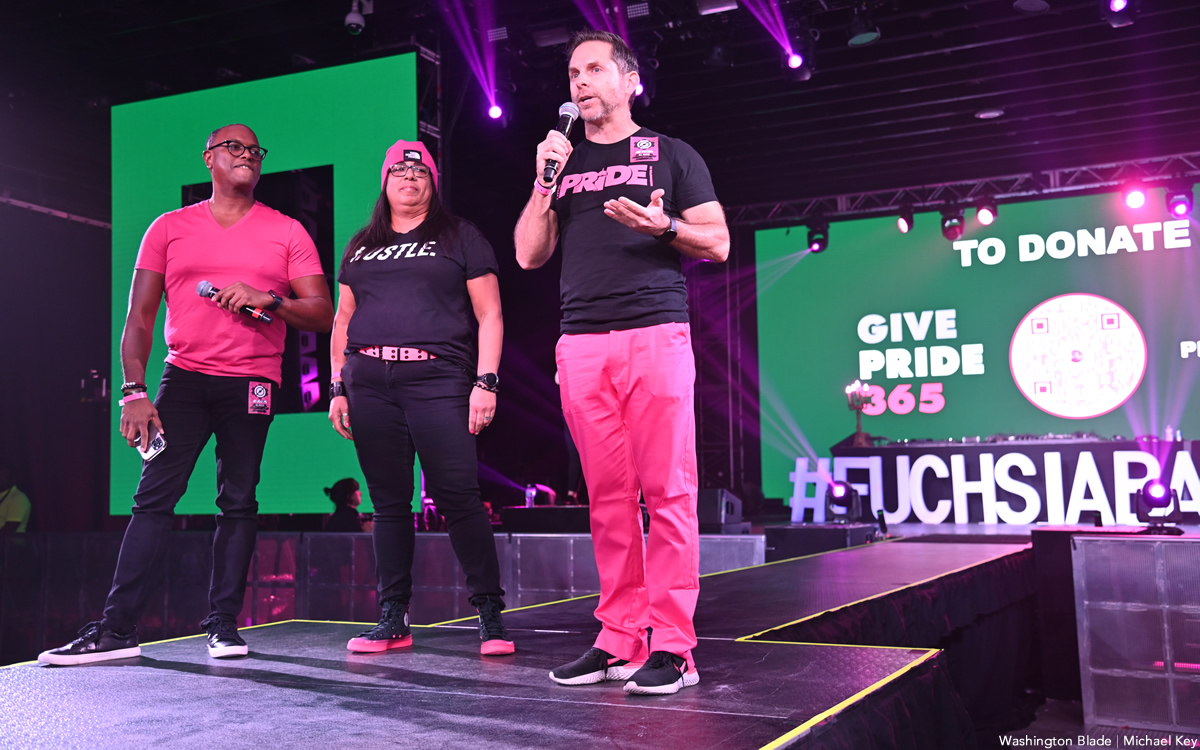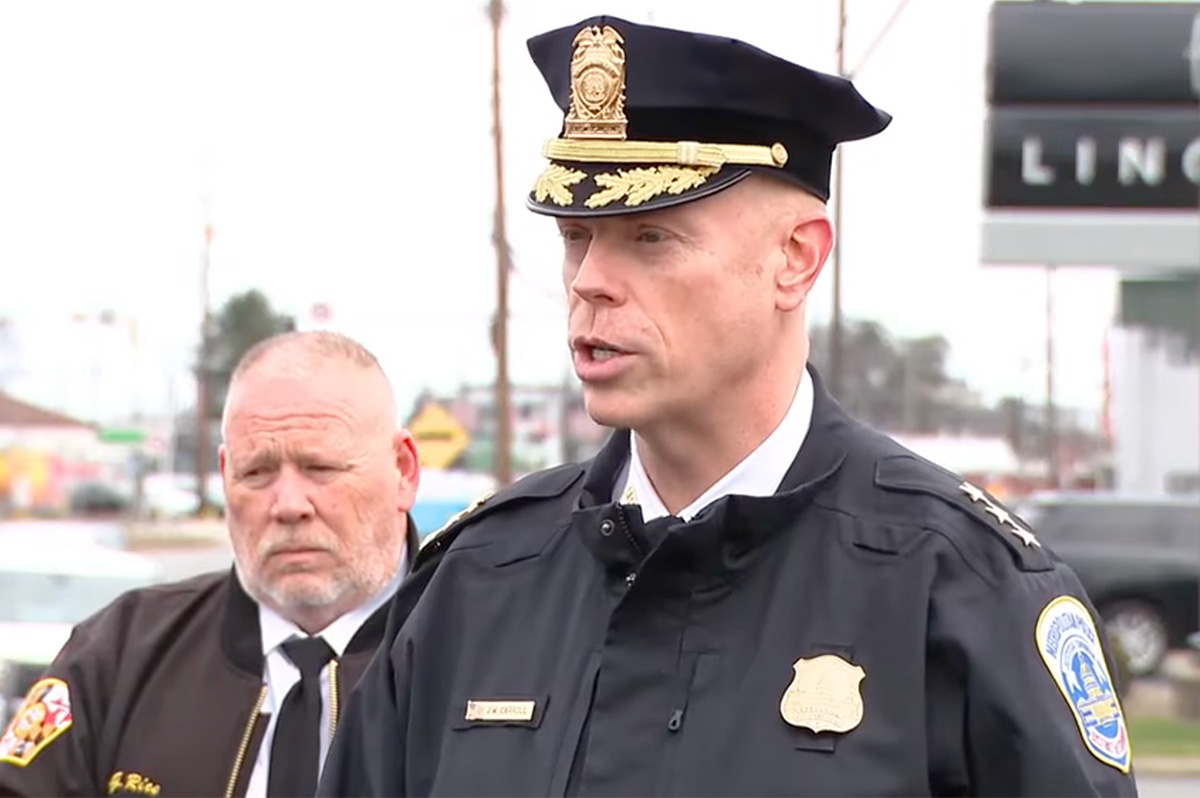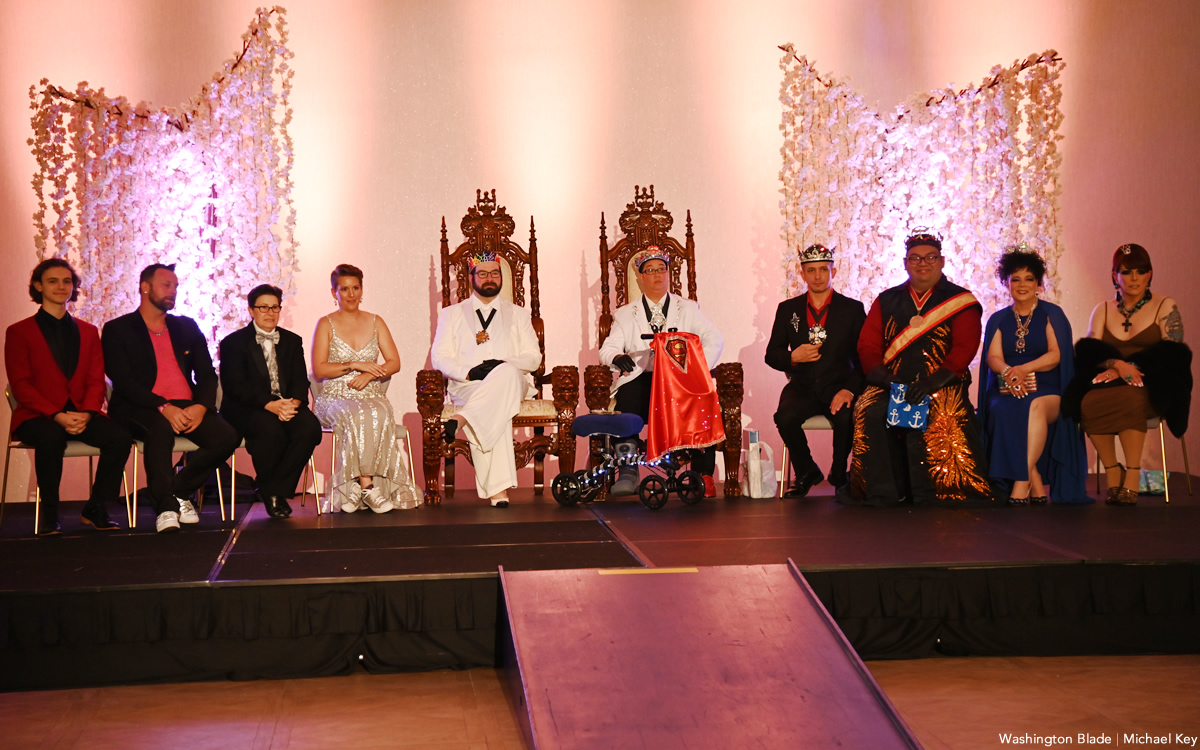District of Columbia
Proposed budget cut by DC Council called harmful to LGBTQ Pride events
Mayor’s office opposes elimination of Festival Fund

The D.C. Council Committee on Business and Economic Development voted on April 27 to approve a series of budget recommendations to the full Council that calls for cutting $1.5 million from a city program that has helped to support the city’s Capital Pride parade and festival.
The program in question, known as the Festival Fund or Special Event Relief Fund, has for many years exempted community-based organizations like the Capital Pride Alliance, from having to pay the costs of street closings and police and other public safety support services for such events.
The proposed cut for this program, if approved by the full D.C. Council, would be part of the city’s fiscal year 2024 budget.
Ryan Bos, executive director of Capital Pride Alliance, said elimination of the Festival Fund program could result in Capital Pride having to pay between $550,000 and $750,000 to hold the city’s popular Capital Pride Parade, Festival, Block Party, and other Pride events in 2024, when the elimination of the Festival Fund would take effect.
“This Fund is essential to supporting events that celebrate the culture of the District of Columbia and its communities, including events like the Capital Pride Celebration – particularly ahead of ensuring a successful World Pride in 2025,” according to a statement Capital Pride released to the Washington Blade.
“Elimination of the Fund may require that we look carefully at each event that we produce to determine where cuts to the budget may be needed,” the statement says. “It is important to note that events such as the Capital Pride Celebration generate significant revenue for the D.C. government,” the statement says.
In mentioning World Pride 2025, the statement was referring to the decision by leaders of the international LGBTQ event known as World Pride, to select D.C. and the Capital Pride Alliance to host the 2025 World Pride in June of that year. Hundreds of thousands of visitors from foreign countries as well as from the host country usually attend Word Pride events.
It couldn’t immediately be determined how the elimination of the city’s Festival Fund would impact the D.C. 2025 World Pride, but the Capital Pride statement suggests the elimination of the fund could dramatically increase the costs for putting it on.
A May 9 press release issued by the office of D.C. Mayor Muriel Bowser expresses opposition to the Council committee’s proposed $1.5 million cut in the Festival Fund budget and the committee’s proposed cuts of $3 million each for two other programs that the release says have supported community-based businesses.
One of them is called the Great Streets and Small Business Fund and the other is known as the Food Access Fund, which supports restaurants in Wards 7 and 8, according to the mayor’s press release.
“Last week, the Council proposed cuts to these three programs, including the elimination of the Festival Fund,” the press release says.
These and multiple other budget-related proposals by the Committee on Business and Economic Development are outlined in detail in a 96-page draft report released on April 27. The report says the committee voted 4-0 to approve the report and its proposals, with one member of the committee — Council member Anita Bonds (D-At-Large) — being absent when the vote was taken.
Those voting yes included Council member Kenyan McDuffie (I-At Large), who chairs the committee, and Council members Brooke Pinto (D-Ward 2), Charles Allen (D-Ward 6), and Vincent Gray (D-Ward 7).
D.C. gay activist John Fanning, who serves as Bonds’s director of constituent services, said Bonds opposes the proposed $1.5 million cut in the Festival Fund budget and plans to urge her fellow Council members to remove the proposed cut from the Council’s final budget proposal.
Fanning said Bonds was absent for the committee vote because she was attending a budget markup hearing at the same time for the Council’s Committee on Executive Administration and Labor for which Bonds is the chairperson.
According to Fanning, Bonds is aware of the importance of the Festival Fund’s support for events like Capital Pride and other events, including the Cherry Blossom Festival, the H Street Festival, the Fiesta DC Hispanic event, and an event called Porchfest.
“Council member Bonds also had concerns that any cancellations of festivals and events would impact the connectivity of people, after several years of isolation during the pandemic,” Fanning said.
Spokespersons for McDuffie and fellow committee members Allen, Pinto, and Gray didn’t immediately respond to a request by the Blade for comment on why they supported the proposed $1.5 million cut in the Festival Fund.
“The Capital Pride Alliance has reached out to the [Council] Chair and all members of the City Council to encourage them to object to this budget cut,” the Capital Pride statement to the Blade says.
The Council’s Committee of the Whole, which consists of all 13 Council members, and that is chaired by Council Chair Phil Mendelson (D-At-Large), was expected to consider, and possibly vote on, all Council committee budget proposals on May 16.
Later in the day on Thursday, May 11, after the Blade posted this story, Councilmember McDuffie responded to Blade’s earlier request for comment on why he and his fellow committee members voted to cut the $1.5 million Festival Fund.
“As a former civil rights attorney and current champion for equity and inclusion on the Council, I support the Pride Parade and appreciate its mission to fight for equality and honor the history of the LGBTQ+ community,” McDuffie told the Blade in a short statement.
But McDuffie said members of the Committee on Business and Economic Development made the difficult decision to make “deep cuts to several programs” to offset what he said was Mayor Bowser’s decision to defund in her proposed budget the Child Wealth Building Act or Baby Bonds program.
That program, McDuffie points out, is designed to “help close the racial wealth gap in our city by investing in children born into poverty” and providing financial support upon their turning 18 years of age to help pay, among other things, for education and purchasing a home.
“I am working with the Council Chairman to identify any available funds to support the Festival Fund,” McDuffie said.
In a separate response to a Blade inquiry, a spokesperson for Council Chair Mendelson said Mendelson is aware of the committee’s decision to cut the Festival Fund and he is looking for a way to restore that funding in his budget proposal. The spokesperson, Lindsey Walton, said Mendelson plans to release his budget proposal on Monday, May 15.
District of Columbia
Kennedy Center renaming triggers backlash
Artists who cancel shows threatened; calls for funding boycott grow

Efforts to rename the Kennedy Center to add President Trump’s name to the D.C. arts institution continue to spark backlash.
A new petition from Qommittee , a national network of drag artists and allies led by survivors of hate crimes, calls on Kennedy Center donors to suspend funding to the center until “artistic independence is restored, and to redirect support to banned or censored artists.”
“While Trump won’t back down, the donors who contribute nearly $100 million annually to the Kennedy Center can afford to take a stand,” the petition reads. “Money talks. When donors fund censorship, they don’t just harm one institution – they tell marginalized communities their stories don’t deserve to be told.”
The petition can be found here.
Meanwhile, a decision by several prominent musicians and jazz performers to cancel their shows at the recently renamed Trump-Kennedy Center in D.C. planned for Christmas Eve and New Year’s Eve has drawn the ire of the Center’s president, Richard Grenell.
Grenell, a gay supporter of President Donald Trump who served as U.S. ambassador to Germany during Trump’s first term as president, was named Kennedy Center president last year by its board of directors that had been appointed by Trump.
Last month the board voted to change the official name of the center from the John F. Kennedy Memorial Center For The Performing Arts to the Donald J. Trump And The John F. Kennedy Memorial Center For The Performing Arts. The revised name has been installed on the outside wall of the center’s building but is not official because any name change would require congressional action.
According to a report by the New York Times, Grenell informed jazz musician Chuck Redd, who cancelled a 2025 Christmas Eve concert that he has hosted at the Kennedy Center for nearly 20 years in response to the name change, that Grenell planned to arrange for the center to file a lawsuit against him for the cancellation.
“Your decision to withdraw at the last moment — explicitly in response to the Center’s recent renaming, which honors President Trump’s extraordinary efforts to save this national treasure — is classic intolerance and very costly to a non-profit arts institution,” the Times quoted Grenell as saying in a letter to Redd.
“This is your official notice that we will seek $1 million in damages from you for this political stunt,” the Times quoted Grenell’s letter as saying.
A spokesperson for the Trump-Kennedy Center did not immediately respond to an inquiry from the Washington Blade asking if the center still planned to file that lawsuit and whether it planned to file suits against some of the other musicians who recently cancelled their performances following the name change.
In a follow-up story published on Dec. 29, the New York Times reported that a prominent jazz ensemble and a New York dance company had canceled performances scheduled to take place on New Year’s Eve at the Kennedy Center.
The Times reported the jazz ensemble called The Cookers did not give a reason for the cancellation in a statement it released, but its drummer, Billy Hart, told the Times the center’s name change “evidently” played a role in the decision to cancel the performance.
Grenell released a statement on Dec. 29 calling these and other performers who cancelled their shows “far left political activists” who he said had been booked by the Kennedy Center’s previous leadership.
“Boycotting the arts to show you support the arts is a form of derangement syndrome,” the Times quoted him as saying in his statement.
District of Columbia
New interim D.C. police chief played lead role in security for WorldPride
Capital Pride says Jeffery Carroll had ‘good working relationship’ with organizers

Jeffery Carroll, who was named by D.C. Mayor Muriel Bowser on Dec. 17 as the city’s Interim Chief of Police, played a lead role in working with local LGBTQ community leaders in addressing public safety issues related to WorldPride 2025, which took place in D.C. last May and June
“We had a good working relationship with him, and he did his job in relation to how best the events would go around safety and security,” said Ryan Bos, executive director of Capital Pride Alliance.
Bos said Carroll has met with Capital Pride officials in past years to address security issues related to the city’s annual Capital Pride parade and festival and has been supportive of those events.
At the time Bowser named him Interim Chief, Carroll had been serving since 2023 as Executive Assistant Chief of Specialized Operations, overseeing the day-to-day operation of four of the department’s bureaus. He first joined the D.C. Metropolitan Police Department in 2002 and advanced to multiple leadership positions across various divisions and bureaus, according to a statement released by the mayor’s office.
“I know Chief Carroll is the right person to build on the momentum of the past two years so that we can continue driving down crime across the city,” Bowser said in a statement released on the day she announced his appointment as Interim Chief.
“He has led through some of our city’s most significant public safety challenges of the past decade, he is familiar with D.C. residents and well respected and trusted by members of the Metropolitan Police Department as well as our federal and regional public safety partners,” Bowser said.
“We have the best police department in the nation, and I am confident that Chief Carroll will meet this moment for the department and the city,” Bowser added.
But Bowser has so far declined to say if she plans to nominate Carroll to become the permanent police chief, which requires the approval of the D.C. City Council. Bowser, who announced she is not running for re-election, will remain in office as mayor until January 2027.
Carroll is replacing outgoing Chief Pamela Smith, who announced she was resigning after two years of service as chief to spend more time with her family. She has been credited with overseeing the department at a time when violent crime and homicides declined to an eight-year low.
She has also expressed support for the LGBTQ community and joined LGBTQ officers in marching in the WorldPride parade last year.
But Smith has also come under criticism by members of Congress, who have accused the department of manipulating crime data allegedly showing lower reported crime numbers than actually occurred. The allegations came from the Republican-controlled U.S. House Oversight Committee and the U.S. Justice Department
Bowser has questioned the accuracy of the allegations and said she has asked the city’s Inspector General to look into the allegations.
Meanwhile, a spokesperson for the D.C. police Office of Public Affairs did not immediately respond to a question from the Washington Blade about the status of the department’s LGBT Liaison Unit. Sources familiar with the department have said a decline in the number of officers currently working at the department, said to be at a 50-year low, has resulted in a decline in the number of officers assigned to all of the liaison units, including the LGBT unit.
Among other things, the LGBT Liaison Unit has played a role in helping to investigate hate crimes targeting the LGBTQ community. As of early Wednesday an MPD spokesperson did not respond to a question by the Blade asking how many officers are currently assigned to the LGBT Liaison Unit.
District of Columbia
Imperial Court of Washington drag group has ‘dissolved’
Board president cites declining support since pandemic

The Imperial Court of Washington, a D.C.-based organization of drag performers that has raised at least $250,000 or more for local LGBTQ and non-LGBTQ charitable groups since its founding in 2010, announced on Jan. 5 that it has ended its operations by dissolving its corporate status.
In a Jan. 5 statement posted on Facebook, Robert Amos, president of the group’s board of directors, said the board voted that day to formally dissolve the organization in accordance with its bylaws.
“This decision was made after careful consideration and was based on several factors, including ongoing challenges in adhering to the bylaws, maintaining compliance with 501(c)(3) requirements, continued lack of member interest and attendance, and a lack of community involvement and support as well,” Amos said in his statement.
He told the Washington Blade in a Jan. 6 telephone interview that the group was no longer in compliance with its bylaws, which require at least six board members, when the number of board members declined to just four. He noted that the lack of compliance with its bylaws also violated the requirements of its IRS status as a nonprofit, tax-exempt 501(c) (3) organization.
According to Amos, the inability to recruit additional board members came at a time when the organization was continuing to encounter a sharp drop in support from the community since the start of the COVID pandemic around 2020 and 2021.
Amos and longtime Imperial Court of Washington member and organizer Richard Legg, who uses the drag name Destiny B. Childs, said in the years since its founding, the group’s drag show fundraising events have often been attended by 150 or more people. They said the events have been held in LGBTQ bars, including Freddie’s Beach Bar in Arlington, as well as in other venues such as theaters and ballrooms.
Among the organizations receiving financial support from Imperial Court of Washington have been SMYAL, PFLAG, Whitman-Walker Health’s Walk to End HIV, Capital Pride Alliance, the DC LGBT Community Center, and the LGBTQ Fallen Heroes Fund. Other groups receiving support included Pets with Disabilities, the Epilepsy Foundation of Washington, and Grandma’s House.
The Imperial Court of Washington’s website, which was still online as of Jan. 6, says the D.C. group has been a proud member of the International Court System, which was founded in San Francisco in 1965 as a drag performance organization that evolved into a charitable fundraising operation with dozens of affiliated “Imperial Court” groups like the one in D.C.
Amos, who uses the drag name Veronica Blake, said he has heard that Imperial Court groups in other cities including Richmond and New York City, have experienced similar drops in support and attendance in the past year or two. He said the D.C. group’s events in the latter part of 2025 attracted 12 or fewer people, a development that has prevented it from sustaining its operations financially.
He said the membership, which helped support it financially through membership dues, has declined in recent years from close to 100 to its current membership of 21.
“There’s a lot of good we have done for the groups we supported, for the charities, and the gay community here,” Amos said. “It is just sad that we’ve had to do this, mainly because of the lack of interest and everything going on in the world and the national scene.”
-

 National5 days ago
National5 days agoWhat to watch for in 2026: midterms, Supreme Court, and more
-

 Opinions5 days ago
Opinions5 days agoA reminder that Jan. 6 was ‘textbook terrorism’
-

 Colombia5 days ago
Colombia5 days agoClaudia López criticizes Trump over threats against Colombian president
-

 District of Columbia5 days ago
District of Columbia5 days agoImperial Court of Washington drag group has ‘dissolved’



















